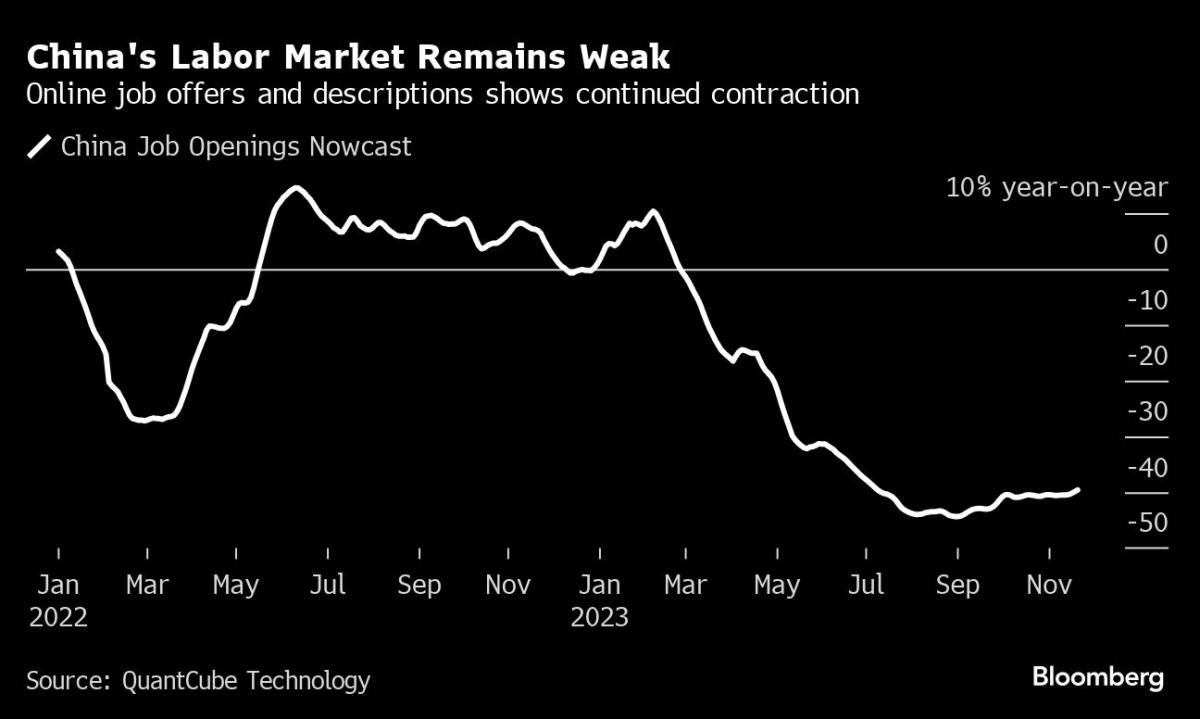(Bloomberg) — Inflation gauges in the US and euro zone are set to show the smallest annual increases since early or mid-2021, reinforcing sentiment that interest rates won’t be raised again.
Most Read from Bloomberg
The Federal Reserve’s preferred measures will be published on Thursday, with the personal consumption expenditures price index seen rising 3.1% in October from a year ago. The core measure, which excludes food and fuel and is considered a better gauge of underlying inflation, is expected to have climbed 3.5%.
Euro-region data for November, also due on Thursday, will probably show inflation at 2.7%, the lowest since July 2021. The underlying measure is seen slowing to 3.9%.
Despite the disinflation progress, officials on both sides of the Atlantic insist they want to see more evidence to be sure that consumer prices are durably under control. On Friday, European Central Bank President Christine Lagarde said that “we’re certainly not declaring victory.”
Fed officials are united around a strategy of being deliberate about the path for policy. Minutes of their last meeting showed that they took note of how higher rates were starting to squeeze households and businesses.
The Fed on Wednesday will issue its Beige Book of economic conditions and anecdotes from across the country.
The US personal income and spending report is also forecast to show only a slight advance in inflation-adjusted consumer outlays. The October downshift in demand help explain forecasts for a slowdown in the economy after a third-quarter growth spurt.
What Bloomberg Economics Says:
“The inflation impulse dulled in October, which should allow the Fed to stay on hold through year-end.”
—Anna Wong, Stuart Paul, Eliza Winger and Estelle Ou, economists. For full analysis, click here
The government issues its first revision to third-quarter gross domestic product on Wednesday, the median forecast in a Bloomberg survey calls for 5% growth. Initial estimate of corporate profits are also expected.
Other US data in the coming week include October new-home sales, November consumer confidence, weekly jobless claims, and a key manufacturing survey.
Further north, Canada will release third-quarter GDP data that will reveal whether it entered a recession, though economists reckon on at least minimal growth. Jobs numbers for November will be the last major data point before the Bank of Canada’s rate decision on Dec. 6.
Elsewhere, the Paris-based OECD presents a new set of forecasts, Lagarde speaks to European lawmakers, and central banks from New Zealand to South Korea are expected to keep rates on hold.
Click here for what happened last week and below is our wrap of what’s coming up in the global economy.
Asia
Central bank governors are expected to gather at the start of the week as part of the Hong Kong Monetary Authority’s global financial summit and Bank for International Settlements conference.
Chinese purchasing manager indexes will start being published toward the end of the week, data to be closely watched by investors for signs of recovery in the world’s second-largest economy.
The Bank of Korea is expected to hold rates steady on Thursday, though it continues to face a tricky policy environment where inflation remains sticky, growth weak and household debt on the rise.
South Korea is also set to report on trade data Friday, one of the earliest looks into how global demand was holding up in November.
The Reserve Bank of New Zealand and the Bank of Thailand are set to make their latest rate decisions on Wednesday, while India will report third quarter GDP the same day.
A range of Asian countries will report on manufacturing PMI data on Friday, from India to Vietnam to Indonesia, giving a broader view into how the region’s economies are holding up.
Bank of Japan board members will speak to business leaders and hold press conferences on Wednesday and Thursday, amid continued speculation over the timing for policy normalization.
The country will also report on industrial production and retail sales data on Thursday, plus labor and business spending data on Friday, after figures showed the Japanese economy contracted in the third quarter.
Europe, Middle East, Africa
Testimony by Lagarde to the European Parliament on Monday will provide investors with something to trade on before the inflation data.
Those numbers will arrive after a drip of national reports starting on Wednesday that are mostly expected to show a synchronized decline across major economies, albeit at divergent levels.
While Spanish inflation probably accelerated, it’s seen weakening in France to 4.1%, and the outcome in Germany is also projected lower at 2.7%. Italian price increases are expected to decelerate markedly further below the ECB’s goal, to 1.1%.
Friday may feature the release of several reports by ratings companies. Among them, S&P Global Ratings is scheduled to publish a view on France, and Scope Ratings could do the same for Italy.
Meanwhile, the German government is struggling to hammer out a revised budget after a shock court ruling earlier this month.
In the UK, several Bank of England policymakers are due to make appearances, including Governor Andrew Bailey, while it’s a quieter week for data.
After Sweden’s Riksbank surprised investors on Thursday by halting rate increases, third-quarter GDP on Wednesday may reveal a recession. Economic weakness was one argument economists gave to keep borrowing costs on hold – although Governor Erik Thedeen hasn’t closed the door on another hike.
On Friday, meanwhile, Swiss data could show that the economy returned to marginal growth during the same period after stalling in the prior three months.
Turning east, Poland will publish inflation, seen staying at 6.6% — more than twice as much as in the neighboring euro region. GDP numbers in the Czech Republic may show a recession.
In Israel, analysts expect the base rate to stay at 4.75% on Monday as the central bank continues supporting the currency. The shekel has recovered all losses since Israel’s war with Hamas began in early October, but officials may refrain from cutting rates until next year.
The same day, Ghana, the world’s second-largest cocoa producer, is set to leave borrowing costs unchanged.
Mauritius on Tuesday is also poised to hold rates steady as inflation has eased below the central bank’s 2% to 5% target range earlier than expected. And with inflation quickening again, gas-rich Mozambique is also likely to keep borrowing costs unchanged on Wednesday.
Latin America
Latin America has a light economic calendar in the coming week, with highlights to include mid-month consumer prices index in Brazil and an inflation report by Mexico’s central bank.
Brazil’s mid-November inflation, due on Tuesday, is expected to further decelerate from a year ago, justifying the central bank’s pledge to deliver at least two more rate cuts of half a percentage point.
Mexico releases its inflation report the following day. The document, which usually brings revisions to growth estimates, may shed light on the timing of a much-anticipated monetary easing cycle.
The central bank has signaled that rate cuts are near, but the latest economic activity data, including third-quarter GDP figures released on Friday, showed Latin America’s second-largest economy is performing better than economists forecast.
Read More: Mexico Cenbank Warns of Inflation Risks Amid Strong Demand
Chile publishes a number of activity and production reports starting on Thursday, the most important being Friday’s Imacec index of economic activity for October. The indicator, considered a proxy for GDP, had its biggest gain in eight months in September, surprising economists.
Also on Friday, Brazil releases industrial production for October, while Mexico publishes remittances data for the same month.
–With assistance from Monique Vanek, Piotr Skolimowski, Yuko Takeo, Molly Smith and Laura Dhillon Kane.
(Updates with German budget woes in EMEA section)
Most Read from Bloomberg Businessweek
©2023 Bloomberg L.P.

Jessica Roberts is a seasoned business writer who deciphers the intricacies of the corporate world. With a focus on finance and entrepreneurship, she provides readers with valuable insights into market trends, startup innovations, and economic developments.







